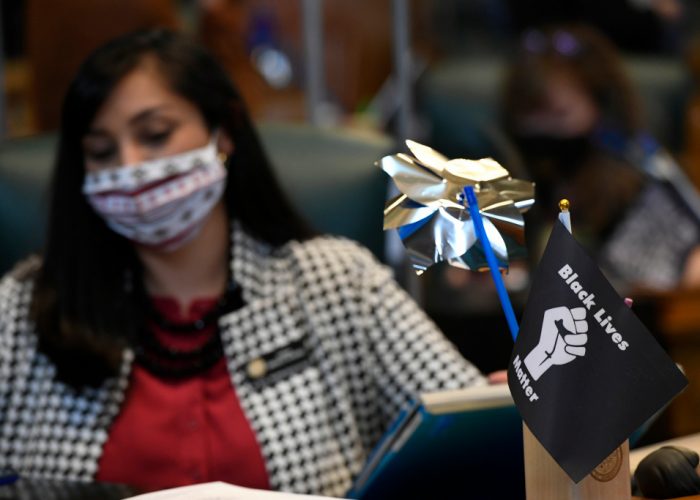Nothing is set in stone yet, but former and current Colorado legislators are worried about the statehouses preliminary redistricting maps, which they believe will decrease representation and voices of communities of color.
The proposed legislative boundaries will significantly decrease Latino populations in districts like Democratic Rep. Serena Gonzales-Gutierrezs, which is House District 4 in northwest Denver. She also believes the maps could mean losing Latino legislators at a time theyre not proportional to the states Latino population of 21%.
The area has already seen a reduction because of gentrification, she said. And even though her seat and others like House District 5 and Senate Districts 32 and 34 are considered Democratic strongholds, Latino lawmakers will likely face primary opponents.
Former Denver mayor and ex-state legislator Wellington Webb told Colorado’s Legislative Redistricting Commission earlier this week that the preliminary maps also dilute representation for the citys Black communities.
There is a historic community of interest that runs from the neighborhoods of North Park Hill all the way to Welton and California Streets in Five Points, Webb said in a statement. To divide them is to clutter the community voices in the ear of that legislator, and risk marginalizing those communities for crucial legislative debates around housing, gentrification, criminal justice and education.
Wellington argued that the maps treat Denver voters as the forgotten stepchild of Colorado.
But Montrose GOP Rep. Sen. Don Coram told The Denver Post that for years and years and years, it was rural Colorado that got the short end of the stick.
Coram said he worked on congressional redistricting a decade ago and the process is much better now than it was then. He believes many of the issues in the preliminary maps will be worked out through the public process (which involves several hearings), and the complaints are coming too early.
To support the important journalism we do, you can become a Denver Post subscriber here.
Questions?
Have a question about Colorado politics? Submit it here and it’ll go straight to The Denver Post politics team.
Ask Us
Top Line
A shopper wears a mask at a Denver King Soopers on May 7, 2020. (Hyoung Chang, The Denver Post)
Mask up, the federal government is suggesting for most of Colorados counties. Delta is on the rise. The Posts Meg Wingerter and Jessica Seaman have more.
Capitol Diary
Just the links
Federal politics By Justin Wingerter
From Seibert to Congress
A few months back, folks in the Eastern Plains town of Seibert (population ~200) discovered their lone grocery store had closed overnight. Despite a campaign by residents, Seibert Supers remains closed. Seiberts Republican congressman wants to do something about that.
Rep. Ken Buck is cosponsoring a bill by Democratic Rep. Steve Cohen, a progressive from Memphis. It would increase tax breaks for companies that open grocery stores in food deserts and breaks that grocery stores receive for hiring locals, veterans and disadvantaged workers. It would also create a new tax credit for stores that sell fresh fruits and vegetables.
Bruce Talbott, president of the Colorado Fruit and Vegetable Growers Association, said in a statement that encouraging grocery stores to establish or stay in business in underserved areas through tax incentives is good public policy. He also supports the new tax credit idea.
Cohen introduced a similar bill in 2019 but it did not have a Republican cosponsor and never made it out of committee. (Observers of Colorado politics might remember Cohen for making questionable claims about U.S. Rep. Lauren Boebert supporting the Jan. 6 rioters.)
Buck, whos as conservative as they come, has blazed a bipartisan streak recently, joining forces with Democrats on Big Tech reform and preservation of the Amache internment site. That matters, because very few bills become law without bipartisan support in Congress.
More federal political news
Haze obscures the skyline as motorists head southbound on Interstate 25 at the intersection with Interstate 70 on July 26, 2021, in Denver. Smoke from numerous wildfires across the interior West has funneled smoke into Colorado, forcing officials to issue ozone alerts. (David Zalubowski, The Associated Press)
Mile High Politics By Erica Hunzinger
A climate note
If youre reading this after 4 p.m. Thursday, youve likely gotten an alert on your phone about another high ozone action day. If so, then the Front Range knocked down a record it’s been setting since last Friday, making it 25 days in a row of high ozone alerts.
Post colleague Bruce Finley reported last week on significant spikes in ozone pollution in July alone — from 104 parts per billion (34 ppb above the federal health limit) at Chatfield State Park to even 76 ppb at Rocky Mountain National Park.
Another Post colleague, Meg Wingerter, detailed what ozone, the levels of which increase as the day gets warmer, can do to your health.
So what can you do? Walk instead of drive. Consolidate errands. Hold off on filling your gas tank until the morning, when levels are lower. And you have the states permission and encouragement not to mow your lawn (if you have a gas-powered mower) when its hot and hazy.
More Denver & suburban news
Forward this newsletter to your colleagues and encourage them to subscribe.read more
The Spot: Latino and Black politicians worry constituents will be redistricted out of a strong voice


